THE DISABLING CONSEQUENCES OF A TRADITIONAL PRACTICE AND OUR REMEDIES
BY SAYYDAH GARRETT
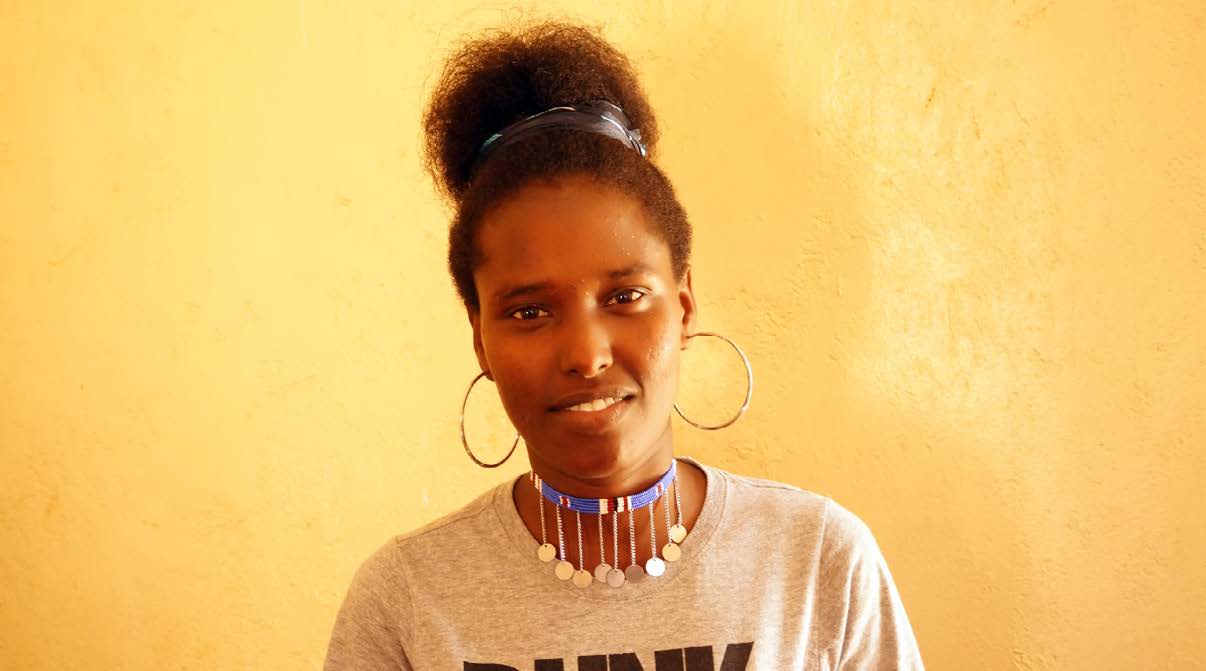
"While we respect and appreciate cultural norms and variants, there are practices that we condemn for their cruelty and inhumanity. We base this on common human practices that provide respect, dignity, and self determination to everyone. This article describes "female mutilation" as practiced in many countries and features an advocate who is dedicated to eradicating the practice. We support Sayydah Garrett and her commitment to protecting the lives of innocent girls and women, many with disabilities and their right to refuse to participate in these indefensible rituals." – Rick Rader, MD, Editor in Chief, EP Magazine (Exceptional Parent); Dr. Steve Perlman, EP Magazine, Editorial Advisory Board
When I went on a solo safari to Kenya in August of 2012 to see my favorite animal, the elephant, in its natural habitat, I certainly never thought that I would return to New Jersey with a promise to eradicate a harmful practice called "female genital mutilation" (FGM).
"Say what?" asked my husband. I told him about my visit to a tribal village in Samburu and how I was fascinated by the beauty of the tribe, colorful attire, amazing hand-beaded jewelry, diet, and how the people welcomed me with songs and dances. When I returned to the lodge in Samburu National Reserve, I summoned Samuel, the young assistant restaurant captain I had met the day before and excitedly showed him pictures of Namayiana Village. I had just visited his village! Who knew? He explained that he was educated, having studied hotel and restaurant hospitality at a Kenyan university. I asked him to tell me more about life in Samburu. Most people in his community don't finish secondary school, let alone go to university. And so, here's where my life changed in my mid 50's. Samuel looked up to the sky and in a contemplative tone said, "Sayydah, I want to start a community based organization to eradicate FGM and forced early marriage before it's my youngest sister's turn to get cut."
"THE CUT"
Samuel revealed a tribal practice that tourists don't learn about during their visits to villages. When girls in his pastoralist (seminomadic people) community reach puberty, they experience a rite of passage to womanhood which requires them to undergo "the cut." FGM refers to all procedures involving partial or total removal of the external female genitalia, or other injury to the female genital organs for non-medical reasons. The removal of the clitoris and labia is performed by a female circumciser who uses a razor blade and no anesthesia. This non-medical procedure is a human rights violation, illegal, gender-based violence against girls and women, and causes dozens of harmful physical, psychological and emotional effects, even death.
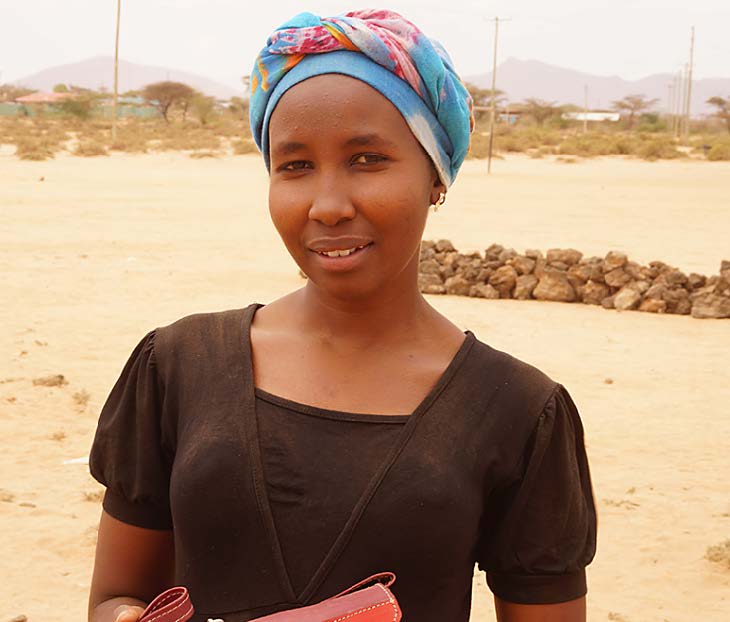
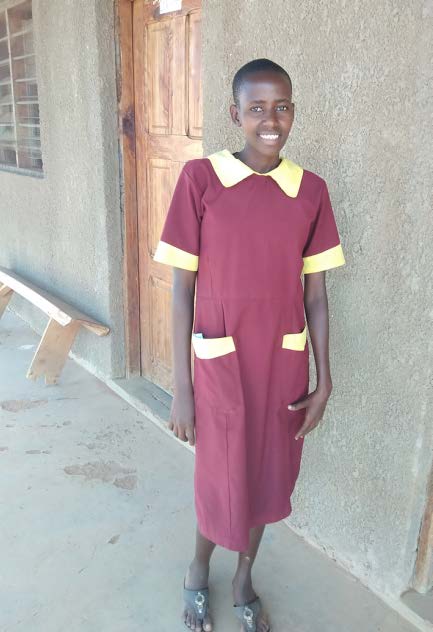
A BETTER FATE: (Opposite page) Makaki Lentoijioni, one of the Pastoralist Child Foundation's first sponsored students, just started studying commerce at the University of Nairobi on a full scholarship; (Above, left to right) Janet Sipayo Lenguris and Jenerik Lekapana have both attended a four-day "Alternative Rite of Passage" where "the cut" is replaced by education.
Although practicing communities around the world perform FGM for various reasons, the primary goal is to suppress female sexual desire. Therefore, it is widely believed and accepted that the cut will ensure chastity and fidelity to husbands. So, why would a Samburu (sister tribe of the Maasai) warrior have this wish? When Samuel's mother was diagnosed with throat cancer and approaching the end of her life, she lamented about not having gone to school and fulfilling her dreams of a better life. She, like 90% of girls in Samburu, underwent FGM and was forced to marry an older man. It was an abusive marriage that ended in divorce. Samuel's mother didn't want the same life outcome for her daughters. Samuel promised his mother that he would take care of his sisters and made a vow to protect them against what he calls "the vice" of FGM. Such a commitment is incredibly unusual for a man whose community is deeply rooted in this tradition.
When I realized how serious Samuel was, I offered to help. "I live 8,000 miles away in New Jersey but I'll help you. I have 10 years of nonprofit experience as a grant writer, fundraiser, and will help raise awareness."
He smiled, pointed at me and said, "Great! You will be our president!" I said, "Ok!" We co-founded Pastoralist Child Foundation (PCF) right then and there. We hadn't known each other 24 hours but I knew instinctively that this was the right thing to do. I believe God is the master planner and this was the real reason for my safari. Oh, and the elephants were amazing!
MEDICAL COMPLICATIONS
FGM is unnecessary and creates suffering to its survivors. It causes various medical complications for girls and women – particularly during childbirth. Babies are born with a higher risk of cerebral palsy due to the prolonged, obstructed labor and lack of oxygen during childbirth. The initial shock of being held down by your own mother and aunties in order to become a "woman" results in initial shock, excessive bleeding, PTSD, and a lifetime of trust issues; infant and maternal mortality rates increase; painful menstruation and intercourse increases; greater risk of depression, infertility, infections, cysts, and keloids, just to name a few. The vast majority of adults we teach are uneducated and illiterate. Therefore, they have no idea that the symptoms experienced are directly linked to FGM. According to WHO (World Health Organization), 200 Million girls and women around the world have undergone FGM. It doesn't just happen in Africa. Communities in the Middle East, Asia and diaspora communities in the UK, US, Europe, Canada, Australia and New Zealand are also affected. In fact, 500,000 women and girls in the United States are at risk of FGM. "Vacation cutting" is currently a great concern as girls in western countries are sent home to their native countries to get cut during school holidays. PCF has begun healing workshops in the US for victims of FGM.
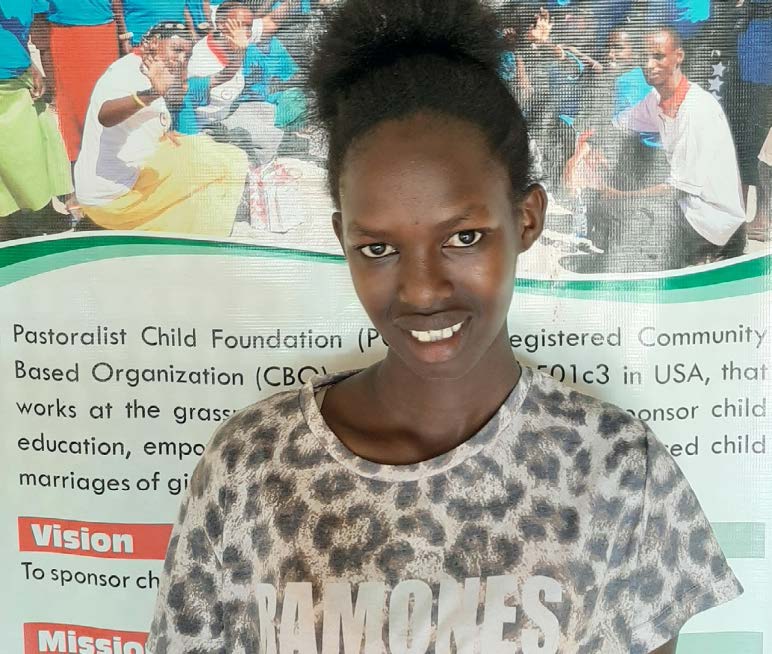
TAKING WING: Brandy Achoto, in grade 10, dreams of becoming a pilot. Quality girls' education empowers by giving them choices, alleviates poverty and yields great returns in socioeconomics, health, population and politics.
In Samburu and Maasai Mara, Kenya many girls are forced into early marriage soon after undergoing the rite of passage. Girls drop out of school and never step into a classroom again. Their roles as wives, some in polygamous marriages, include bearing children, cooking, cleaning, fetching water, building huts, and washing clothes in crocodile infested rivers. This makes me very sad and angry. This isn't how teen girls should live. What can they look forward to?
THE SOLUTION IS EDUCATION
So far, I've presented a bleak picture of a horrific practice. The good news is that PCF has saved over 2,000 girls from undergoing FGM. The solution is education. PCF provides workshops, inter generational dialogues, and scholarships for girls to attend secondary boarding schools and universities. Our workshop attendees are as young as eight years old up to village chiefs in their 90's. We incorporate the "Do No Harm" approach where every member of the workshop is heard, respected, and taught to work together to resolve conflicting views.
The girls' workshops are a four-day "Alternative Rite of Passage" for 60 participants where "the cut" is replaced by education. The curriculum consists of FGM, child marriage, teen pregnancy, sexual & reproductive health and rights, child rights, HIV/AIDS, self-confidence, self-awareness, and the importance of education. Parents are informed of the curriculum and are aware that PCF's mission is to end a harmful practice. PCF has gained the trust of the communities for its commitment to preserve the positive aspects of the Samburu and Maasai cultures. We only wish to abolish the negative aspects.
In our efforts to accelerate the abandonment of FGM, we collaborate with all stakeholders – teachers, healthcare workers, social workers, religious leaders, local government, village chiefs, former circumcisers, and many anti-FGM activists and organizations around the world who have pledged to end FGM by the year 2030. We're partners with UNICEF-Kenya, UNFPA, the Anti-FGM Board of Kenya, and committed to the United Nations Sustainable Development Goals (SDG's) 3: good health & wellbeing; 4: quality education; 5: gender equality.
PCF has a scholarship program for girls to attend secondary boarding schools and universities. We interview and select highperforming girls to receive full tuition and boarding at excellent schools. Educated girls are more likely to stay in or near their communities and become mothers who encourage their children to go to school. Quality girls' education empowers by giving them choices, alleviates poverty and yields great returns in socio-economics, health, population and politics. Education leads to increased income for girls themselves, but also for nations as a whole. We currently have 19 sponsored students – 15 in secondary school and 4 in university. The yearly sponsorship rate is $1,500.00 which pays for tuition, exam fees, computer fees, healthcare, transportation, uniforms, bedding, laundry detergent, personal care products, and a private lock box. The girls have realistic dreams about their futures. With hard work and focus on academics, they will become accountants, nurses, doctors, engineers, broadcasters, etc.
Brandy, in grade 10, wants to be a pilot. Imagine if one day I board a plane and see her as my pilot! Wow! And there's Makaki, one of our very first sponsored students and brightest scholar. She just started studying commerce at the University of Nairobi on a full scholarship. This is why we do what we do. Education makes all the difference. PCF is keeping its promise to Samuel's mother.
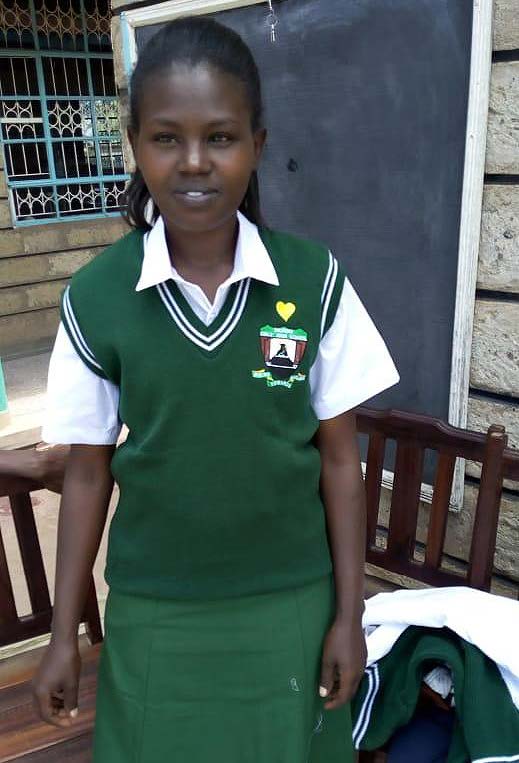
A BRIGHTER FUTURE: Efforts of the Pastoralist Child Foundation have helped Dableya Sambakah, who has been spared FGM and benefited from educational programs.
Another method of educating teens is through our annual youth soccer and volleyball tournament. We invite 400 youths from across Samburu County to compete for three days for the coveted PCF trophies. Girls compete in volleyball and boys compete in soccer. All athletes must attend workshops during their stay. The curriculum covers FGM, child marriage, teen pregnancy, HIV/AIDS, and alcohol & substance abuse. Unfortunately, teens don't have constructive after school or weekend activities that prevent them from engaging in risky behaviors. PCF would love to build a youth center where they can learn music, art, theater, sports training, poetry, chess, and other games to pass the time in a positive way.
SUCCESS STORIES
Let's return to Namayiana Village. While in Samburu in 2015, I was requested to meet with the women there. We have become great friends and I love each and every one of them. They always express their gratitude for PCF's dedication to helping them live happier and healthier lives. Many tourists come and go, but very few keep the promise to "stay in touch." They were excited to give me some news. I wondered, "What could it be? Is someone going to have a baby? Is someone getting married?" Well, it was neither. The women registered their self-help group to generate income so they could send more girls to school. And, the entire village unanimously agreed to never perform FGM on anymore girls! This was the best news ever! They now understood the importance of education. Soon after this announcement, PCF secured a grant for the women to construct a jewelry and artifacts store near Samburu National Reserve. The women sell their beautiful items to tourists and the local community.
Another success story is the formation of two registered women's self-help groups following our youth and adult workshops in Maasai Mara. Each group has 30 women, with a chair lady, secretary, and treasurer. Members pay a nominal monthly membership fee and they decide together how to invest the money. In August, 2019 we facilitated a table banking seminar for the women. We also secured a grant for them to purchase 17 bulls and 40 lambs. The animals will be fattened and sold for a profit. Proceeds will pay for children's school uniforms and school supplies. The women are keen on learning how to sew the uniforms themselves and plan on eventually purchasing sewing machines.
MORE TO DO
I have been to Kenya eight times since 2012. It's a long journey from New Jersey, yet I still get excited about going. My calling arrived almost eight years ago, and although our nonprofit has achieved successful milestones, there's still more to do. The population of Samburu is 260,000 people and in Maasai Mara it's about 1.2 million. I envision the day when FGM is eradicated. It must be eradicated. It causes too much harm and no longer has a place in society. Its time has come, at least by the year 2030. We at Pastoralist Child Foundation are so thankful for each and every person who believes in and supports our work that some call "noble." I am humbled. I am grateful for this opportunity to serve my fellow man and woman, no matter where they may reside. I tell my friends, "You know me. I'm a global citizen. I could have been anywhere in the world at that time of my life. I didn't choose Kenya. It chose me."
So, in August I'll pack three big suitcases with donated soccer cleats, school supplies, clothes, backpacks and candy to distribute to happy, screaming, excited children… okay, adults too. If you'd like to learn more about PCF (a 501C3 registered nonprofit), make a donation, sponsor a student, collaborate, volunteer, or become a corporate sponsor, please visit our website at pastoralistchildfoundation.org You may also email me directly at sayydah@pastoralistchildfoundation.org or call (973) 980-7860. •
ABOUT THE AUTHOR:
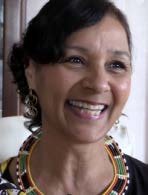
Sayydah Garrett was born in Montreal, Quebec, Canada. Since childhood she has seen her parents set the good example of helping less fortunate people in their community. This instilled the lifelong passion Sayydah has for helping others. Her personal mission statement is, "Tell me what you want and I'll help you get it." Sayydah is a certified ESL (English as a Second Language) and Adult Basic Education (ABE) instructor. She holds a Bachelor of Arts, Honours in Russian Language & Literature from Carleton University in Ottawa, Ontario, Canada. Sayydah lives in New Jersey with her husband, award-winning jazz saxophonist and composer, Kenny Garrett.